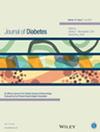To examine the relationship between serum carotenoid levels and cardiovascular-kidney-metabolic (CKM) syndrome in a representative sample of US adults.
Data from the fasting subsample of the NHANES 2017–2018 were analyzed using a survey-weighted approach to ensure the findings are representative of the broader US adult population. Serum levels of α-carotene, β-carotene, β-cryptoxanthin, lutein/zeaxanthin, and lycopene were measured using high-performance liquid chromatography. CKM syndrome stages were defined according to the 2023 American Heart Association guidelines, with advanced CKM syndrome categorized as stages 3 or 4. Associations between serum carotenoids and advanced CKM syndrome were assessed using logistic regression and weighted quantile sum (WQS) regression.
The study included 1671 adults aged 20 years and older, with a mean age of 48.7 years and a gender distribution of 50.9% female and 49.1% male. Higher serum levels of α-carotene, β-carotene, α-cryptoxanthin, lutein/zeaxanthin, and lycopene were inversely associated with advanced CKM syndrome. Specifically, compared to the lowest quartile, the highest quartile of α-carotene had an odds ratio (OR) of 0.29 (95% CI: 0.16–0.55), β-carotene 0.35 (95% CI: 0.16–0.78), α-cryptoxanthin 0.23 (95% CI: 0.11–0.49), lutein/zeaxanthin 0.26 (95% CI: 0.14–0.48), and lycopene 0.58 (95% CI: 0.35–0.98). However, β-cryptoxanthin did not show a significant association. Moreover, the combined effect of all carotenoids was significantly negatively correlated with advanced CKM syndrome (OR = 0.67, 95% CI: 0.53–0.86), with lutein/zeaxanthin contributing the most (44.56%).
Elevated serum carotenoid levels are inversely associated with the prevalence of advanced CKM syndrome in a dose-dependent manner, with this association remaining consistent across diverse demographic and health subgroups.



